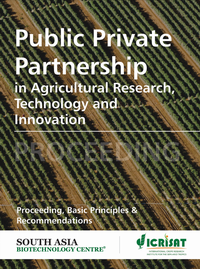
SABC & ICRISAT Recommend Measures to Boost PPP in Agriculture Research
July 11, 2018| |

The recommendations emphasize the urgency to put in place a clear policy and institutional mechanism to spur PPP for both the upstream and downstream sides of agricultural value-chain. Below are the recommendations from the roundtable meeting on PPP to overcome concerns raised by stakeholders:
- Recognize PPP in the form of a policy instrument as the most effective mechanism for research, technological innovations, and transfer of technology from lab to land.
- Announce a clear policy statement and develop an institutional mechanism and guidelines on PPP in agriculture with a well-defined scope of activities, roles and responsibilities and time-bound executions.
- Constitute a national level committee for promotion of PPP strategy for progressive growth and development of Indian agriculture.
- Create PPP modules to inspire, educate, and utilize its potential in agriculture.
- Develop guidelines and formalize the PPP framework spanning from joint research and development to product commercialization.
- Decentralize the process of collaboration depending on the kind of PPP.
- Develop guidelines for sharing costs to be incurred by partners on upscaling, evaluation, and commercialization of technologies conceived under PPP model.
- New technologies such as gene editing have emerged as an important tool to improve crop productivity or value of the crop, and therefore there is a strong need for public-private collaborative initiatives to conduct joint R&D for development of varieties fortified with nutrition and resistant to biotic and abiotic stresses
For more information about PPP in agricultural research, technology, and innovation, visit the SABC and ICRISAT websites.
| |
Biotech Updates is a weekly newsletter of ISAAA, a not-for-profit organization. It is distributed for free to over 22,000 subscribers worldwide to inform them about the key developments in biosciences, especially in biotechnology. Your support will help us in our mission to feed the world with knowledge. You can help by donating as little as $10.
-
See more articles:
-
News from Around the World
- Journalist and Experts Promote Biotech to Attain Food Security
- Birthplace of African Rice Domestication Found in Mali
- American Soybean Association Requests Accurate Bioengineered Food Labeling
- LibertyLink® GT27™ Soybeans Commercialized in the U.S.
- Public Consultations Set for Golden Rice Field Trials
- Scientists Discover Genetic Resistance to Wheat Fungal Disease
- Int'l Research Team Finds New Receptor Used in Symbiosis between Legumes and Rhizobia
- JIC Study on Rice Blast Pathogen Elucidates Plant-pathogen Co-evolution
-
Research Highlights
- Rice MicroRNA Improves Abiotic Stress Tolerance in Creeping Bentgrass
- Researchers Find Gene for Manganese Tolerance in Rice
-
From the BICs
- SABC & ICRISAT Recommend Measures to Boost PPP in Agriculture Research
-
Announcements
- BioTaiwan 2018
-
Resources
- Author Shares Journey from Anti-GMO Activism to GMO Advocacy at Talking Biotech Podcast
-
Plant
- Study Explains Auxin's Role in Rice Root Proliferation
- GS9 Regulates Rice Grain Shape and Appearance
- Researcher Uses CRISPR-Cas9 as Immune System for Plants
- CRISPR-Edited Tobacco Produces Improved Proteins for Pharmaceutical Use
- Genome Editing in Agriculture: Methods, Applications, and Governance
-
Read the latest: - Biotech Updates (December 17, 2025)
- Gene Editing Supplement (December 17, 2025)
- Gene Drive Supplement (February 22, 2023)
-
Subscribe to BU: - Share
- Tweet
